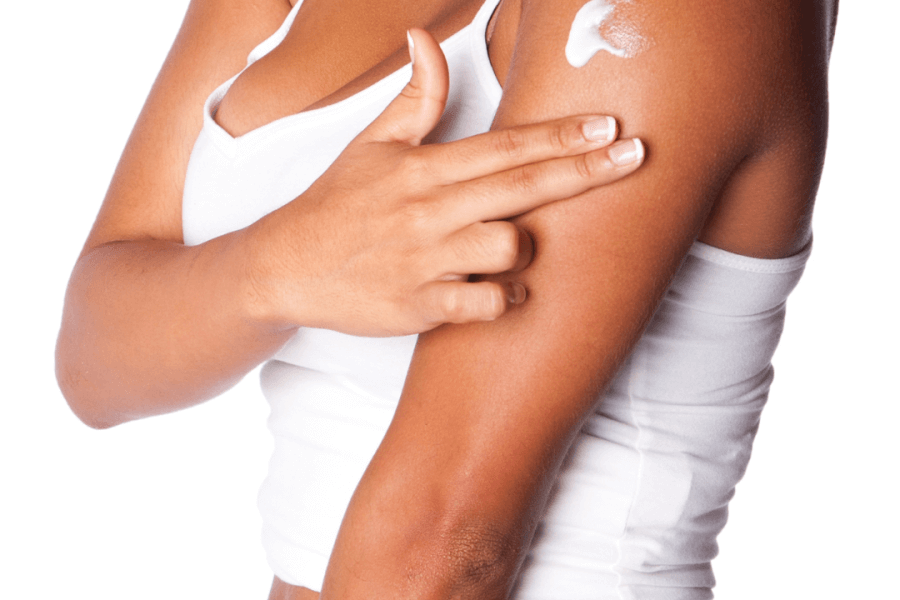
7 Signs You Have Sensitive Skin

Is it sensitive skin or something else?
Your skin can become sensitive for many reasons, ranging from environmental factors like fluctuation in temperature to internal triggers such as hormonal change. Most people think of sensitive skin as skin that is easily irritated. You may find that certain products or environmental factors cause you to get red, itchy, or even break out. Eczema, psoriasis and rosacea are commonly mistaken for sensitive skin. Your dermatologist is your best resource to determine the cause of your problem skin areas and develop a treatment plan to get and keep your skin clear–no matter the cause. To determine if it is sensitive skin, your healthcare professional may ask you if you experience some common symptoms.

Signs & Symptoms
Dry skin- while people with sensitive skin may have problems with breakouts, they often have underlying dryness instead of oiliness. Having very dry skin ranging from redness, tightness, roughness and itching can also be a cause of the sensitivity, as very dry skin does not protect the nerve endings in the skin very well. You will likely have more problems with dry skin in cold, dry weather and when exposed to wind. Use a gentle moisturizer like George’s Special Dry Skin Cream to protect your skin from the elements and keep it soft, supple and healthy-looking.
Read below to discover other potential signs:
1) Reactive skin
If you have sensitive skin, you probably notice you develop symptoms in response to certain triggers like hormonal changes due to pregnancy, the menstrual cycle and puberty. Common triggers include soaps, detergents, fragrances, perfumes, skincare products, and household products. In addition, exposure to cold, sun, and wind can trigger flare-ups. Your dermatologist can help you find out what you may need to avoid and choose products that are best suited for your skin.
2) Stinging and burning skin
Your skin may sting and burn when you cleanse with or apply products that are too strong for you. This is especially common with gels, products with alcohol and many anti-aging or acne products. While this is usually temporary, it can be very uncomfortable and even painful. If something causes stinging or burning of your skin, remove it as quickly as possible and rinse with cool water.
3) Itching skin
Your sensitive skin may often feel itchy and tight, especially after cleansing with products that are too harsh. Using hot water can make it worse. You may especially notice itching when the air is cold and dry. Giving in to the itch by scratching can lead to more irritation and even infection. Talk to your doctor and/or dermatologist about better ways to stop the itch.
4) Sun allergies
Your sensitive skin is more susceptible to the harmful effects of the sun. If your skin is already irritated or peeling, you are at an even higher risk. These symptoms are accompanied by blisters, pustules and raised rashes. Areas most affected tend to be the face, arms (and underside of the arms), palms and the chest. You should always wear sunscreen when you’re outside, especially on your face. Since some ingredients in sunscreens can cause allergic reactions, look for ones with the ingredients zinc oxide or titanium dioxide. You’ll also want to choose a sunscreen that is broad-spectrum and has SPF 30 or higher.
5) Peeling and flaking skin
If you have extremely dry skin, you may deal with a lot of flaking and even peeling. This can be embarrassing and can sometimes look like dandruff. If the peeling is deep, or if you pick at it, it can leave raw, painful skin patches that are at risk for infection and even scarring.
6) Stretching skin
Changes due to skin stretching – through pregnancy, weight gain or growth spurts – can result in stretch marks, which can also be highly sensitive and easily irritated. These are most likely to appear on the breasts, abdomen and upper thighs.
7) Rashes develop
Sensitive skin may develop a red, dry, flaky, or bumpy rash when exposed to a trigger. This is especially true for products that are left on your skin, such as facial oils, serums or creams. You may develop a rash very quickly after contact. Rashes can be uncomfortable, unsightly, and stubborn. If you’re allergic to something; however, it is more serious than sensitive skin. Make sure to consult a health care professional when needed.
Keep your skin healthy. It’s our body’s largest organ and healthy skin reflects overall wellness. Choose skincare products, including cleansers and moisturizers, that are fragrance-free and that do not include irritants such as perfumes and colourants.
Try George’s Cream Special Dry Skin Cream for dry and very dry and sensitive skin.
*DISCLAIMER: THIS CONTENT DOES NOT PROVIDE MEDICAL ADVICE. This website serves the purpose of providing general information and does not in any way replace or substitute professional medical advice, diagnosis or treatment. Always seek the advice of a qualified healthcare professional regarding your health. If you think you may have a medical emergency, contact your doctor immediately or call 911.
*Disclaimer: George's Special Dry Skin Cream does not treat underlying skin conditions
